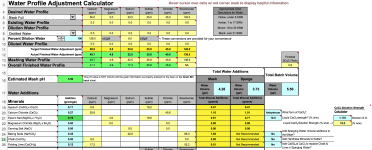apples-to-oranges
Apprentice
- Joined
- Feb 21, 2016
- Messages
- 4
- Reaction score
- 0
I'm using Bru'n water 3.4 for a robust porter. I'm using the Black Full profile and building my water from RO/deionized water.
I can adjust the salt additions to hit my "Mashing Water Profile" spot on, but need to add some alkalinity (NaHCO3 and Ca(OH)2) to get my pH to the proper range. Since it's not good to add alkalinity to the sparge water (Bru'n water doesn't even allow it), the "Overall Finished Water Profile" ends up being low on sodium and calcium. I've included a screenshot to show what I mean.
Is there any way to compensate for this? Should I try to hit my mash water profile as close as I can and not worry about the overall finished water? Or try to hit the overall finished water, and my mash pH, and not worry about hitting the other values for the mash water profile?
I can adjust the salt additions to hit my "Mashing Water Profile" spot on, but need to add some alkalinity (NaHCO3 and Ca(OH)2) to get my pH to the proper range. Since it's not good to add alkalinity to the sparge water (Bru'n water doesn't even allow it), the "Overall Finished Water Profile" ends up being low on sodium and calcium. I've included a screenshot to show what I mean.
Is there any way to compensate for this? Should I try to hit my mash water profile as close as I can and not worry about the overall finished water? Or try to hit the overall finished water, and my mash pH, and not worry about hitting the other values for the mash water profile?

